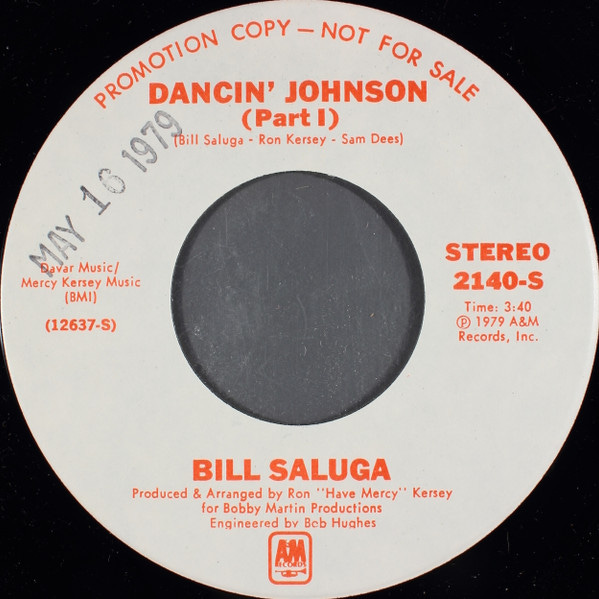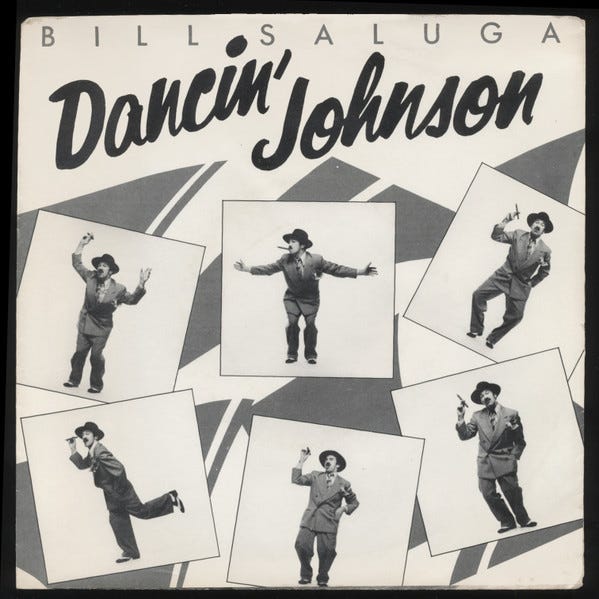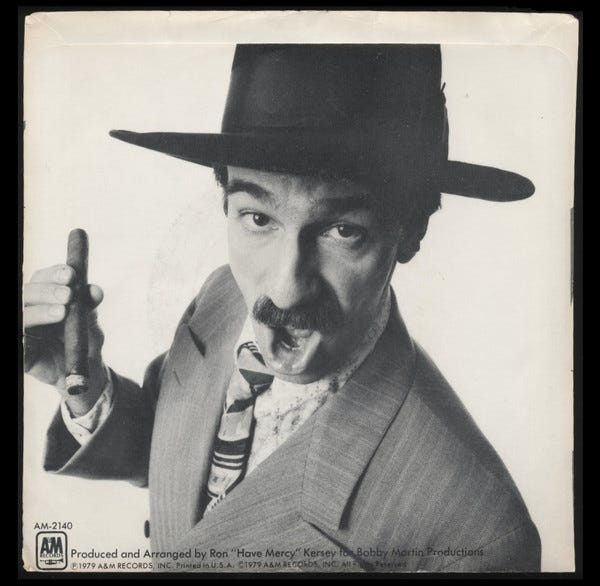But Ya Doesn't Hasta Call Me Disco
Bill Saluga — "Dancin' Johnson" (1978)
Bill Saluga died back in March at the age of 85, though for whatever reason his departure from this plane of existence wasn’t widely announced until last week. If you’re under 40, you probably have no idea who he was; but if you were a regular TV viewer back in the 1970s, you’ll doubtless recall his recurring bit as the zoot-suited, cigar-chomping Raymond J. Johnson Jr.
Saluga’s whole shtick revolved around taking offense whenever someone would call him “Johnson”. “Ohhhhh, you can call me Ray, or you can call me Jay,” he’d bray, running down every conceivable permutation of his name until finally announcing, “But ya doesn’t hasta call me Johnson!” “Oh, I’m sorry, Mr. Johnson!” the other person would say, and the whole infernal soliloquy would begin again from the top…
This was annoyance-as-comedy, something Monty Python’s Flying Circus specialized in, only they had the good sense not to run Eric Idle’s “Nudge-Nudge, Wink-Wink” guy or Michael Palin’s Ken Shabby every week. Saluga, on the other hand, was seemingly omnipresent on late-’70s TV, appearing everywhere from The Gong Show to The Redd Foxx Comedy Hour to commercials for Natural Lite beer.
Even in elementary school, the appeal of Raymond J. Johnson completely eluded me. There was one kid in my fifth grade class who liked to parrot Saluga’s act, but he usually got a stern “Shut up!” or a hard flick to the head from me or one of my other friends before he could even utter “…or you can call me Ray Jay!” Not that we weren’t into some really stupid shit, as well; but even by our considerably-less-than-discerning standards, the Raymond J. Johnson thing just struck us as punishingly dumb.
I mean, good for Saluga — I know he paid his comedy dues for years, even working with Fred Willard as part of the Ace Trucking Company comedy troupe back in the late ‘60s, before he found something that really worked for him. The American public seemingly couldn’t get enough of Raymond J. Johnson, so who could blame him for giving them more of what they wanted?
One thing the American public emphatically did not ask for, however, was for Raymond J. Johnson to go disco.
The grim, supremely cringe-inducing spectacle of Bill Saluga lip-syncing “Dancin’ Johnson” on The Mike Douglas Show in June 1979 has never completely left my brain, however much I’ve tried to banish it. I’ve never been able to find a clip of that performance, which is probably for the best — the 21st century does not need to see Saluga doing the funky chicken in his zoot suit while miming the words “I wantsta boogie some more!” I loved disco then, and I love it now — but this was definitely a moment where I thought the “Disco Sucks” barbarians then massing at the gate might have had a point.
As we get further and further away from July 1979’s Disco Demolition Night at Comiskey Park, the late-’70s disco backlash has been painted in increasingly stark terms, with disco lovers on one side and racists and homophobes on the other. Which was partly the truth, but there was a lot more nuance to it as well. Because while there were a lot of brilliant disco records made between 1975 and 1980, there were also a lot of novelty disco singles like Rick Dees’ 1976 hit “Disco Duck” (and its flop follow-up “Dis-Gorilla”); and after the blockbuster success of 1977’s Saturday Night Fever soundtrack, record companies large and small began churning out all manner of awful disco cash-ins. “Dancin’ Johnson,” first released in late 1978 as an extended 8-minute disco track, and then again in the spring of 1979 as an edited single, was one of these.
How “Dancin’ Johnson” actually came to be made remains something of a mystery. What’s clear, however, is that there was no shortage of talent behind its creation. The song was co-written by Saluga with Southern soul singer-songwriter Sam Dees (whose songs had previously been recorded by Clarence Carter, Gladys Knight and Larry Graham) and songwriter-producer-arranger Ron “Have Mercy” Kersey, best known for co-writing and arranging The Trammps’ massive “Disco Inferno”. (One of the very first singles I ever bought!)
“Dancin’ Johnson” was also engineered by Bob Hughes, who’d cut his teeth manning the board for Jimi Hendrix on his 1970 single “Stepping Stone,” before going on to work with Jackson Browne, Fleetwood Mac, Frank Zappa and a number of other notable artists. While none of the musicians or backing vocalists involved are listed on the record, they were probably first-call session pros. Certainly A&M Records, the label that released “Dancin’ Johnson,” wasn’t short of funds for a high-end session.
But no one bought “Dancin’ Johnson,” just as no one bought The Ethel Merman Disco Album, which was released by A&M in June 1979. Records like these cheapened the disco genre for those who loved it, and made disco an increasing source of annoyance (and even a target of hatred) for those who didn’t. Factor in disco’s omnipresence in the mainstream by the summer of ‘79 — not just on the radio, but on TV, at the movies, and even at department stores like J.C. Penney — and what was once a vibrant underground cultural movement had been fully transformed into a disposable commodity in just a few years, by an entertainment industry seeking to squeeze every last egg from its golden goose before consumers lost interest. And consumers lost interest a lot earlier than they might have, thanks to all the crappy disco they were force-fed. Ultimately, disco’s greatest enemies were not the troglodytes who sought to destroy it, but the greedheads who sought to exploit it.
So you can call him Ray, or you can call him Jay, but you doesn’t haveta call him “Dancin’ Johnson”. And, in fact, you probably shouldn’t — even in death, I’m not entirely sure that Saluga won’t pop up and start his spiel all over again.






What a blast from the past. And beautiful adverb implementation: "punishingly" my favorite. Yes, this dude's spiel was annoying. RIP to him and his routine. Side note: my wife does a hilarious Ethel Merman imitation, adapting it for unlikely fare such as Madonna's "Like a Virgin." She will be amused to learn of Ethel's disco excursion.
Man, everyone boarded the disco train then!